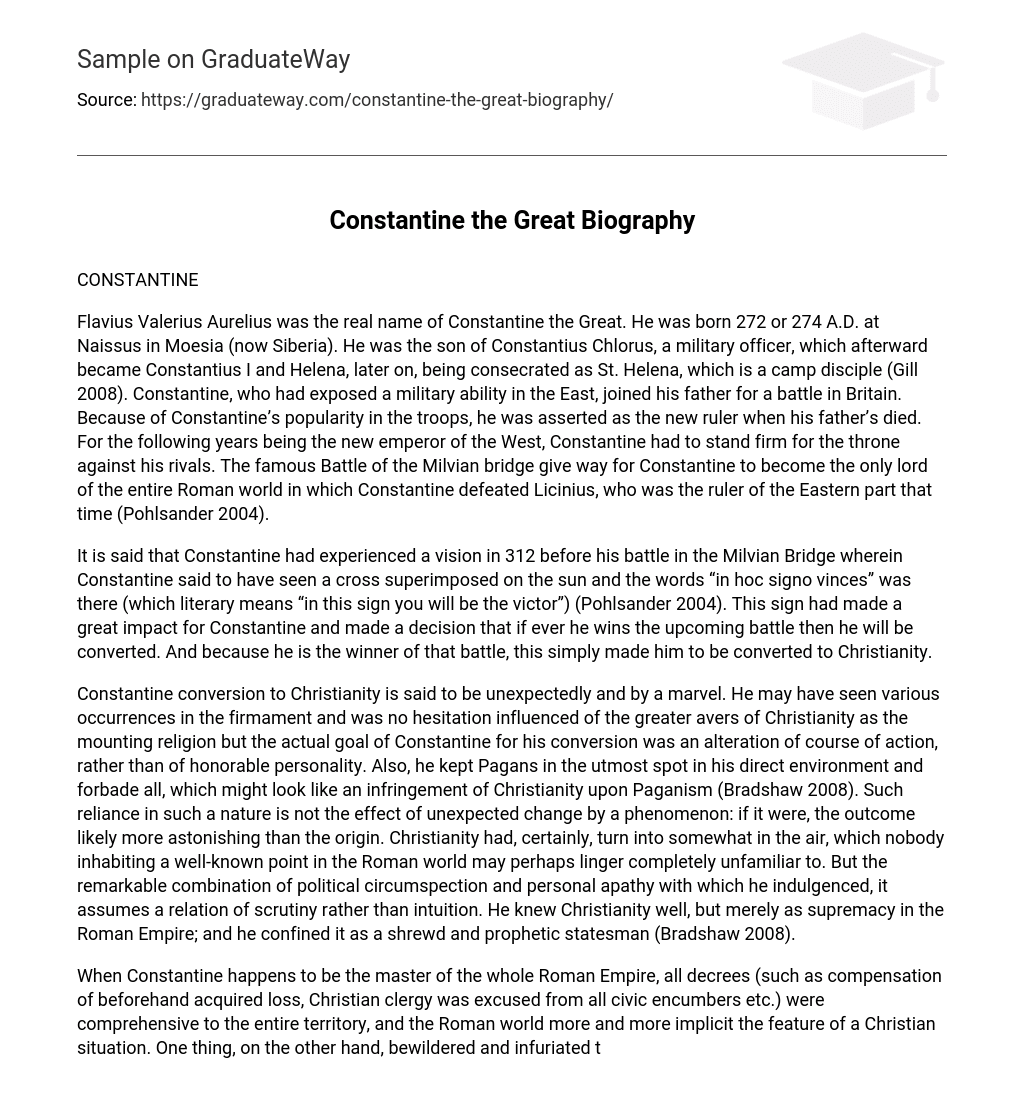CONSTANTINE
Flavius Valerius Aurelius was the real name of Constantine the Great. He was born 272 or 274 A.D. at Naissus in Moesia (now Siberia). He was the son of Constantius Chlorus, a military officer, which afterward became Constantius I and Helena, later on, being consecrated as St. Helena, which is a camp disciple (Gill 2008). Constantine, who had exposed a military ability in the East, joined his father for a battle in Britain. Because of Constantine’s popularity in the troops, he was asserted as the new ruler when his father’s died. For the following years being the new emperor of the West, Constantine had to stand firm for the throne against his rivals. The famous Battle of the Milvian bridge give way for Constantine to become the only lord of the entire Roman world in which Constantine defeated Licinius, who was the ruler of the Eastern part that time (Pohlsander 2004).
It is said that Constantine had experienced a vision in 312 before his battle in the Milvian Bridge wherein Constantine said to have seen a cross superimposed on the sun and the words “in hoc signo vinces” was there (which literary means “in this sign you will be the victor”) (Pohlsander 2004). This sign had made a great impact for Constantine and made a decision that if ever he wins the upcoming battle then he will be converted. And because he is the winner of that battle, this simply made him to be converted to Christianity.
Constantine conversion to Christianity is said to be unexpectedly and by a marvel. He may have seen various occurrences in the firmament and was no hesitation influenced of the greater avers of Christianity as the mounting religion but the actual goal of Constantine for his conversion was an alteration of course of action, rather than of honorable personality. Also, he kept Pagans in the utmost spot in his direct environment and forbade all, which might look like an infringement of Christianity upon Paganism (Bradshaw 2008). Such reliance in such a nature is not the effect of unexpected change by a phenomenon: if it were, the outcome likely more astonishing than the origin. Christianity had, certainly, turn into somewhat in the air, which nobody inhabiting a well-known point in the Roman world may perhaps linger completely unfamiliar to. But the remarkable combination of political circumspection and personal apathy with which he indulgenced, it assumes a relation of scrutiny rather than intuition. He knew Christianity well, but merely as supremacy in the Roman Empire; and he confined it as a shrewd and prophetic statesman (Bradshaw 2008).
When Constantine happens to be the master of the whole Roman Empire, all decrees (such as compensation of beforehand acquired loss, Christian clergy was excused from all civic encumbers etc.) were comprehensive to the entire territory, and the Roman world more and more implicit the feature of a Christian situation. One thing, on the other hand, bewildered and infuriated the sovereign greatly, – the disagreement of the Christians, their continuous argue regarding the principle, and the fervent abhorrence thus provoked. In the Roman Kingdom, large amount of different religions subsists serenely close to each other, and now was a faith that might not survive in tranquility with itself. For political basis, though, concord and synchronization were essential. Because of the assembled that takes place between the Christian Church and the Roman State, it looks as if that Constantine met there with gentlemen who ought to have enamored and daunted him by their impressive straightforwardness, fraught, and roughly cramped, as he was by the colossal intricacy of the Roman verve and that the thought of a kingship of God’s elegance instigated to portray upon human race.
Constantine amalgamated a wobbling empire, restructured the Roman situation and places the period for the ultimate triumph of Christianity. A lot of contemporary intellectuals agree to the genuineness of his sacred certainty. His fervor was a plodding progression; initially, he perhaps connected Christ with the conquering sun divinity. Even though condemned by his opponents as a supporter of a rudimentary and forged religion, Constantine fortified the Roman Empire and guaranteed its continued existence in the East. As the prime ruler to rule in the name of Christ, he was a main stature in the establishment of medieval Europe.
Bibliography
Bradshaw, Robert I. 23 December 2008. Emperor constantine. Early Churg.org.uk. Accessed 31 January 2008. Available from http://www.earlychurch.org.uk/constantine.php.
Gill, N.S. 2008. Constantine the great – emperor constantine i. About, Inc. Accessed 31 January 2008. Available from http://ancienthistory.about.com/cs/people/p/constantine.htm.
Pohlsander, Hans A. 8 January 2004. Constantine i (306 – 337 a.D.). De Imperatoribus Romanis. Accessed 31 January 2008. Available from http://www.roman-emperors.org/conniei.htm.





